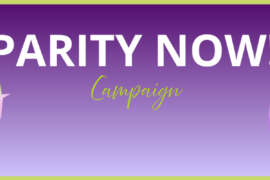When the war in Ukraine broke out, Vera Vladimirovna faced the toughest decision of her life. With uncertainty about the future, she took her four children and headed to Moldova. Along the way, she had one hope: to find a safe place where she could breathe freely and where her children, including her daughter with autism, could have a chance at a normal life. Although her wish was granted, every step came with new challenges and transformations that changed her life in unexpected ways.
Once in northern Moldova, Vera quickly realized that courage alone was not enough to ensure her children’s well-being. “We had nothing, just the hope that things would get better. The warmth with which Moldovans welcomed us is something I’ll never forget,” she says.
As Vera began a new chapter in Moldova, support came not only from the local community but also from organizations dedicated to helping refugees. Among them was Gender-Centru, which, through its project “Promoting Women’s Leadership and Coordinating Gender Equality in Refugee Response in Moldova,” created a dialogue platform for refugee women’s voices, including Vera’s, to be heard and respected. These consultations, organized by Gender-Centru, help identify the real needs of refugee women and transform them into concrete solutions developed in partnership with local and international actors. The resulting interventions are designed to provide tailored, long-term support.
This support network gave Vera the confidence that, together, they could build a safer future for her and her children.
However, the daily challenges were immense. “For my daughter with autism, I needed more resources and support. That’s when I decided to move closer to Chisinau, where we could access therapies and specialists to help her develop.”
This move was another leap into the unknown, but Vera found new strength and, in a way, even a new vocation.
In Ukraine, Vera was an engineer, and the thought of changing her profession had never crossed her mind. Everything changed, however, when she arrived in Moldova and realized her daughter needed specialized speech therapy support. “I started learning about speech therapy out of necessity. I was figuring out how to help her, but soon I discovered it was something that brought me deep satisfaction.”
Today, Vera is on the verge of completing a master’s degree in speech therapy at the Ion Creanga State Pedagogical University in Moldova. With this training, she can not only provide her daughter with the support she needs but has also become a resource for other children in need of speech therapy.
As she got more involved, Vera felt that this new path was more than just a necessity for her daughter—it became a passion, a way to rediscover herself and give back to the community that supported her every step of the way. “I never thought I’d give up engineering, but here I’ve found another purpose: helping children express themselves and communicate. It’s like every bit of their progress gives me hope, too.”
Now, Vera’s four children have integrated into their new environments. The eldest continues online studies at a Ukrainian university, two attend schools in Moldova, and her daughter with autism receives care and developmental activities at a specialized center.
Vera, now a speech therapist, looks back with pride at the journey she has taken. “It took time, patience, and a lot of support, but I feel like I’ve surfaced. Moldova is where I managed to rediscover myself,” she says, her eyes filled with emotion. Through her transformation from engineer to speech therapist, Vera has shown that a woman can live many lives, follow many paths, and always find a way forward, even when all seems lost.
Vera Vladimirovna’s story is a profound testament to resilience and transformation. Her experience inspires other women to trust in themselves and their ability to find the strength to change their life’s course, even when faced with the greatest challenges.
This story was developed as part of the project “Promoting Women’s Leadership and Coordinating Gender Equality in Refugee Response in Moldova,” implemented by Gender-Centru in partnership with UN Women, with financial support from the National Committees.




Comentarii sunt blocate.